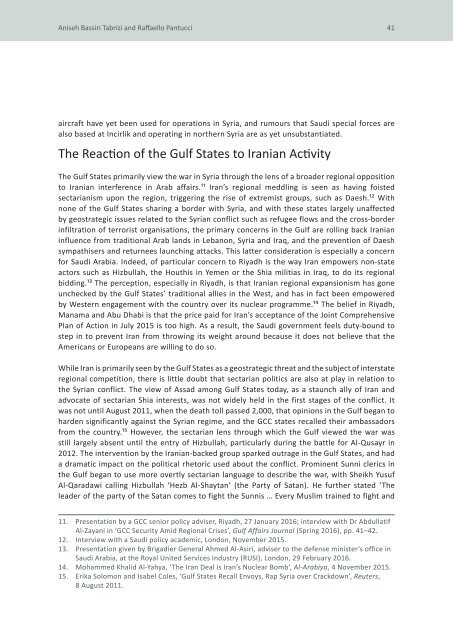Understanding Iran’s Role in the Syrian Conflict
201608_op_understanding_irans_role_in_the_syrian_conflict_0
201608_op_understanding_irans_role_in_the_syrian_conflict_0
You also want an ePaper? Increase the reach of your titles
YUMPU automatically turns print PDFs into web optimized ePapers that Google loves.
Aniseh Bassiri Tabrizi and Raffaello Pantucci 41<br />
aircraft have yet been used for operations <strong>in</strong> Syria, and rumours that Saudi special forces are<br />
also based at Incirlik and operat<strong>in</strong>g <strong>in</strong> nor<strong>the</strong>rn Syria are as yet unsubstantiated.<br />
The Reaction of <strong>the</strong> Gulf States to Iranian Activity<br />
The Gulf States primarily view <strong>the</strong> war <strong>in</strong> Syria through <strong>the</strong> lens of a broader regional opposition<br />
to Iranian <strong>in</strong>terference <strong>in</strong> Arab affairs.11 <strong>Iran’s</strong> regional meddl<strong>in</strong>g is seen as hav<strong>in</strong>g foisted<br />
sectarianism upon <strong>the</strong> region, trigger<strong>in</strong>g <strong>the</strong> rise of extremist groups, such as Daesh.12 With<br />
none of <strong>the</strong> Gulf States shar<strong>in</strong>g a border with Syria, and with <strong>the</strong>se states largely unaffected<br />
by geostrategic issues related to <strong>the</strong> <strong>Syrian</strong> conflict such as refugee flows and <strong>the</strong> cross-border<br />
<strong>in</strong>filtration of terrorist organisations, <strong>the</strong> primary concerns <strong>in</strong> <strong>the</strong> Gulf are roll<strong>in</strong>g back Iranian<br />
<strong>in</strong>fluence from traditional Arab lands <strong>in</strong> Lebanon, Syria and Iraq, and <strong>the</strong> prevention of Daesh<br />
sympathisers and returnees launch<strong>in</strong>g attacks. This latter consideration is especially a concern<br />
for Saudi Arabia. Indeed, of particular concern to Riyadh is <strong>the</strong> way Iran empowers non-state<br />
actors such as Hizbullah, <strong>the</strong> Houthis <strong>in</strong> Yemen or <strong>the</strong> Shia militias <strong>in</strong> Iraq, to do its regional<br />
bidd<strong>in</strong>g.13 The perception, especially <strong>in</strong> Riyadh, is that Iranian regional expansionism has gone<br />
unchecked by <strong>the</strong> Gulf States’ traditional allies <strong>in</strong> <strong>the</strong> West, and has <strong>in</strong> fact been empowered<br />
by Western engagement with <strong>the</strong> country over its nuclear programme.14 The belief <strong>in</strong> Riyadh,<br />
Manama and Abu Dhabi is that <strong>the</strong> price paid for <strong>Iran’s</strong> acceptance of <strong>the</strong> Jo<strong>in</strong>t Comprehensive<br />
Plan of Action <strong>in</strong> July 2015 is too high. As a result, <strong>the</strong> Saudi government feels duty-bound to<br />
step <strong>in</strong> to prevent Iran from throw<strong>in</strong>g its weight around because it does not believe that <strong>the</strong><br />
Americans or Europeans are will<strong>in</strong>g to do so.<br />
While Iran is primarily seen by <strong>the</strong> Gulf States as a geostrategic threat and <strong>the</strong> subject of <strong>in</strong>terstate<br />
regional competition, <strong>the</strong>re is little doubt that sectarian politics are also at play <strong>in</strong> relation to<br />
<strong>the</strong> <strong>Syrian</strong> conflict. The view of Assad among Gulf States today, as a staunch ally of Iran and<br />
advocate of sectarian Shia <strong>in</strong>terests, was not widely held <strong>in</strong> <strong>the</strong> first stages of <strong>the</strong> conflict. It<br />
was not until August 2011, when <strong>the</strong> death toll passed 2,000, that op<strong>in</strong>ions <strong>in</strong> <strong>the</strong> Gulf began to<br />
harden significantly aga<strong>in</strong>st <strong>the</strong> <strong>Syrian</strong> regime, and <strong>the</strong> GCC states recalled <strong>the</strong>ir ambassadors<br />
from <strong>the</strong> country.15 However, <strong>the</strong> sectarian lens through which <strong>the</strong> Gulf viewed <strong>the</strong> war was<br />
still largely absent until <strong>the</strong> entry of Hizbullah, particularly dur<strong>in</strong>g <strong>the</strong> battle for Al-Qusayr <strong>in</strong><br />
2012. The <strong>in</strong>tervention by <strong>the</strong> Iranian-backed group sparked outrage <strong>in</strong> <strong>the</strong> Gulf States, and had<br />
a dramatic impact on <strong>the</strong> political rhetoric used about <strong>the</strong> conflict. Prom<strong>in</strong>ent Sunni clerics <strong>in</strong><br />
<strong>the</strong> Gulf began to use more overtly sectarian language to describe <strong>the</strong> war, with Sheikh Yusuf<br />
Al-Qaradawi call<strong>in</strong>g Hizbullah ‘Hezb Al-Shaytan’ (<strong>the</strong> Party of Satan). He fur<strong>the</strong>r stated ‘The<br />
leader of <strong>the</strong> party of <strong>the</strong> Satan comes to fight <strong>the</strong> Sunnis … Every Muslim tra<strong>in</strong>ed to fight and<br />
11. Presentation by a GCC senior policy adviser, Riyadh, 27 January 2016; <strong>in</strong>terview with Dr Abdullatif<br />
Al-Zayani <strong>in</strong> ‘GCC Security Amid Regional Crises’, Gulf Affairs Journal (Spr<strong>in</strong>g 2016), pp. 41–42.<br />
12. Interview with a Saudi policy academic, London, November 2015.<br />
13. Presentation given by Brigadier General Ahmed Al-Asiri, adviser to <strong>the</strong> defense m<strong>in</strong>ister’s office <strong>in</strong><br />
Saudi Arabia, at <strong>the</strong> Royal United Services Industry (RUSI), London, 29 February 2016.<br />
14. Mohammed Khalid Al-Yahya, ‘The Iran Deal is <strong>Iran’s</strong> Nuclear Bomb’, Al-Arabiya, 4 November 2015.<br />
15. Erika Solomon and Isabel Coles, ‘Gulf States Recall Envoys, Rap Syria over Crackdown’, Reuters,<br />
8 August 2011.


